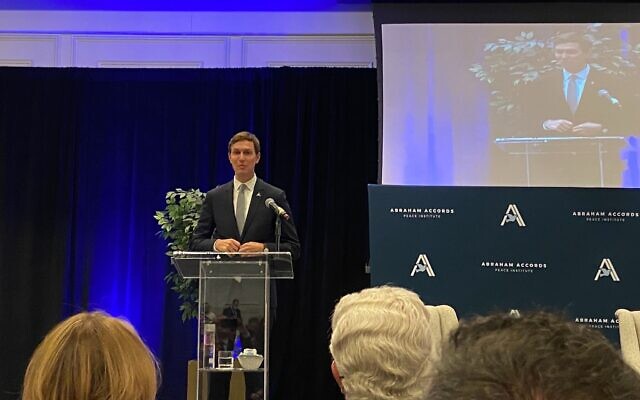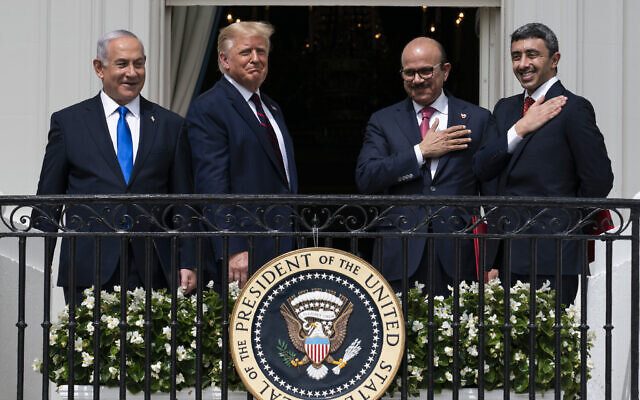WASHINGTON — Former White House senior adviser Jared Kushner warned Tuesday that the benefits of the Abraham Accords that he helped broker a year ago could slip away if the agreements aren’t “nurtured.”
“If these [normalization] agreements are not nurtured, we run the risk that they could go backward, but if we nourish them properly, the potential for what can come from them is enormous and beyond our expectations,” Kushner said at an event in Washington marking the one-year anniversary of the Abraham Accords’ signing.
The comments weren’t explicitly directed at the Biden administration, which sent a representative from the US State Department to the confab full of Trump allies and surrogates at the Georgetown Four Seasons Hotel. But Kushner’s successors in the White House will determine whether the Abraham Accords will become a partisan initiative associated solely with the Republican party, or one that can be advanced by administrations on both sides of the aisle.
US President Joe Biden has expressed his support for the endeavor, telling Prime Minister Naftali Bennett in the White House last month that he will work to develop the existing agreements Israel signed with the United Arab Emirates, Bahrain, Morocco, Sudan, and Kosovo in the past year, in addition to expanding the accords to include new countries in the Arab and Muslim world willing to establish diplomatic ties with the Jewish state.
However, he hasn’t appointed a specific envoy to spearhead the issue, as was the case under Trump. Some of his staffers have also sidestepped referring to the normalization agreements as the “Abraham Accords,” in an apparent attempt to dissociate from the previous administration.
Nonetheless, Acting Assistant Secretary of State for Near Eastern Affairs Yael Lempert was sent on behalf of the administration to Kushner’s event. She declined an interview request but said she was “proud” to be in attendance.

Former White House official Jared Kushner speaks at an event in Washington marking the one-year anniversary of the Abraham Accords, on September 14, 2021. (Jacob Magid/Times of Israel)
Separately on Tuesday, the US State Department announced that Secretary of State Antony Blinken will on Friday host an event marking the Abraham Accords anniversary, using the Trump team-coined term to describe the initiative. Blinken will be joined virtually by the foreign ministers of Israel, the UAE, Bahrain, and Morocco “and discuss ways to further deepen ties and build a more prosperous region,” a State Department spokesperson said.
Getting Sudan ‘over the finish-line’
Notably absent from Friday’s official commemoration will be Sudan, whose new civilian-backed government — desperate for US financial support — promised Trump it would move forward in its ties with Israel, but has since been hesitant in the face of public opposition.
Khartoum signed a preliminary normalization agreement with Israel last October, but the deal has yet to be finalized.
Biden’s National Security Council director for the Middle East Barbara Leaf told Jewish leaders last month that the White House is working on getting the Sudan-Israel deal “over the finish line,” but no progress has been reported.
Sudan declined an invitation to attend a Monday event hosted by the Israeli Mission to the UN marking the one-year anniversary with the UAE, Bahrain and Morocco. However, its ambassador to the US, Nureldin Satti, was in attendance on Tuesday and received a shoutout from Kushner. He ducked out early, however, managing to avoid a group photo of representatives of countries involved in the normalization agreements.

Malka Leifer’s attorney Nick Kaufman speaks to reporters outside the Jerusalem District Court after his client’s extradition hearing on July 20, 2020. (Jacob Magid/Times of Israel)
Nick Kaufman — a British-Israeli attorney who advised Sudan’s transitional government in their proceedings at the International Criminal Court and went on to hand-deliver letters between former prime minister Benjamin Netanyahu and Sudanese leader Gen. Abdel Fattah al-Burhan that produced the breakthrough in ties between the two countries — told The Times of Israel Tuesday that the Sudanese normalization agreement was categorically different from the others Israel signed last year.
“Sudan is not part of the Abraham Accords, and the agreement wasn’t initiated by the US at all. It was the other way around,” he said in a phone call. “Sudan wanted to get off the [State Department’s list of state terror sponsors] and saw Netanyahu as a way to get through to the White House.”
Kaufman said the slow progression of Sudan’s normalization agreement, compared to Israel’s other new allies, has less to do with the US and external factors and more to do with the country’s own internal politics.
“The leadership there is split between the military council, which [initiated the warming of ties with Israel] and the civilian government, which has communist and [Palestine Liberation Organization]-supporting roots,” he said.
Nonetheless, Kaufman predicted that the agreement will eventually be finalized, noting that it is a US interest to draw Sudan away from Russian influence in Africa, but that “it’ll take time.”

Sudanese demonstrators burn Israeli flags during a rally against their country’s recent signing of a deal on normalizing relations with the Jewish state, outside the cabinet offices in the capital Khartoum, on January 17, 2021 (ASHRAF SHAZLY / AFP)
Peace without Palestine
Tuesday’s gathering was hosted by the Abraham Accords Peace Institute, which Kushner established earlier this year to foster the normalization agreements between Israel and a series of Muslim and Arab countries, which he helped negotiate on behalf of the Trump administration.
Critics of the Trump approach have said that the accords should not be a substitute for a peace settlement between Israel and the Palestinians, with the previous administration staunchly backing the Jewish state, including its right to annex West Bank land.
The Palestinian issue did not even make it into Kushner’s prepared 10-minute remarks and only received a shoutout when a heckler burst into the ballroom at the Georgetown Four Seasons Hotel, shouting “peace will not happen until Palestinians are free.”
She was quickly ushered out of the room by a pair of security guards, after which Kushner remarked that, “There’s so much available to the Palestinians today and to their leadership if they just focused on what’s best for their people.”
After Kushner spoke, AAPI executive director Robert Greenway moderated a panel featuring Israel’s Ambassador to the US Gilad Erdan, UAE’s Ambassador to the US Yousef al-Otaiba and Bahrain’s Ambassador to the US Sheikh Abdullah bin Rashid al-Khalifa.
Each of the envoys highlighted the benefits that the normalization agreements had brought to their respective countries.

Abraham Accords Peace Institute executive director Rob Greenway, Israel’s Ambassador to the US Gilad Erdan, UAE’s Ambassador to the US Yousef al-Otaiba and Bahrain’s Ambassador to the US Sheikh Abdullah bin Rashid al-Khalifa at a Washington event marking the one year anniversary of the Abraham Accords on September 14, 2021. (Jacob Magid/Times of Israel)
Otaiba referred to a goal set by his economy minister a day earlier to grow economic ties with Israel to over $1 trillion in a decade.
“That’s a pretty ambitious forecast, but I think it’s achievable and is exactly what we need to get out of the pandemic,” the Emirati envoy said.
Khalifa noted that the visits his country’s citizens have been able to make to the al-Aqsa Mosque in the past year “have changed the way Bahrainis interacted with one another and with Israelis.”
Erdan said the Abraham Accords provide an opportunity for the formation of an anti-Iran coalition of “moderate” countries in the region that can adopt a united diplomatic initiative for combatting the Tehran nuclear threat.
“I learned from Yousef [who says], we are all talking about the JCPOA as if this is the only diplomatic solution. It’s not. We all oppose it the JCPOA and we think differently,” Erdan said, speaking on behalf of the other countries in the room who have not been as forceful as Israel in their opposition to Iran nuclear deal that the Biden administration is seeking to revive.
“It would sound differently if our countries together… hopefully with Saudi Arabia would adopt a different diplomatic solution and the world [would] be exposed to it from our coalition,” the Israeli envoy said.

FILE – In this Tuesday, Sept. 15, 2020 file photo, Israeli Prime Minister Benjamin Netanyahu, left, then-US President Donald Trump, Bahrain Foreign Minister Khalid bin Ahmed Al Khalifa and United Arab Emirates Foreign Minister Abdullah bin Zayed al-Nahyan react on the Blue Room Balcony after signing the Abraham Accords during a ceremony on the South Lawn of the White House in Washington. (AP Photo/Alex Brandon)
Can the Knesset play a role?
Traveling the furthest to attend Tuesday’s ceremony were MKs Ruth Wasserman Lande (Blue and White) and Ofir Akunis (Likud) who co-chair a parliamentary Caucus for the Promotion and Implementation of the Abraham Accords.
Lande told The Times of Israel on the sidelines of the event that the caucus is indicative of the “bipartisan” support the normalization agreements receive in the Knesset, with every party — including the Islamist Ra’am — represented, except for the majority-Arab Joint List.
She said the panel would serve as a platform for inviting officials, experts and grassroots activists to advance the Abraham Accords.
Lande said the caucus could also be used to develop earlier peace agreements Israel has signed, including the one with Egypt. The freshman Blue and White lawmaker, who was stationed as a diplomat in Cairo during the early 2000s, said Israel could offer to help Egypt solve its dispute with Ethiopia over the Nile River Dam and demand warmer ties with Egypt and greater pressure on Hamas to return the civilian captives and bodies of fallen soldiers that the terror group is holding in Gaza.
Lande dismissed the notion that only the US could play a central role in advancing normalization. “The caucus can be an engine. Every person can make a huge difference. Look at what Otaiba did and the outsized role that he played in the Abraham Accords.”
“It’s not just possible. It’s more than possible,” she added.
World - Latest - Google News
September 15, 2021 at 04:40AM
https://ift.tt/2VFArLu
Kushner warns against neglecting Abraham Accords at one-year anniversary event - The Times of Israel
World - Latest - Google News
https://ift.tt/2SeTG7d
https://ift.tt/35oCZy1
Bagikan Berita Ini














0 Response to "Kushner warns against neglecting Abraham Accords at one-year anniversary event - The Times of Israel"
Post a Comment